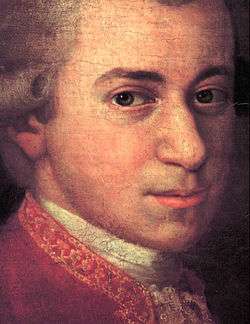Violin Concerto No. 1 (Mozart)
Wolfgang Amadeus Mozart's Violin Concerto No. 1 in B-flat major, K. 207, was originally supposed to have been composed in 1775 (when Mozart was 19), along with the other four wholly authentic violin concerti. However, analysis of handwriting and the manuscript paper on which the concerto was written suggest that the actual date of composition might have been 1773. It has the usual fast-slow-fast structure. Movements are:
- Allegro moderato
- Adagio
- Presto.
The concerto is full of brilliant passage work with running sixteenth notes and is generally characterized by high spirits. The Rondo in B-flat, K. 269 for violin and orchestra, is also connected to this concerto. It was intended to replace the finale movement, and was composed to fulfill the recommendation of Antonio Brunetti, a violinist in Salzburg at the time. Nonetheless, the concerto is typically performed with the original finale, and the K. 269 Rondo remains a separate concert-piece.
External links
- Konzert in B für Violine und Orchester KV 207: Score and critical report (German) in the Neue Mozart-Ausgabe
- Violin Concerto No. 1: Scores at the International Music Score Library Project
